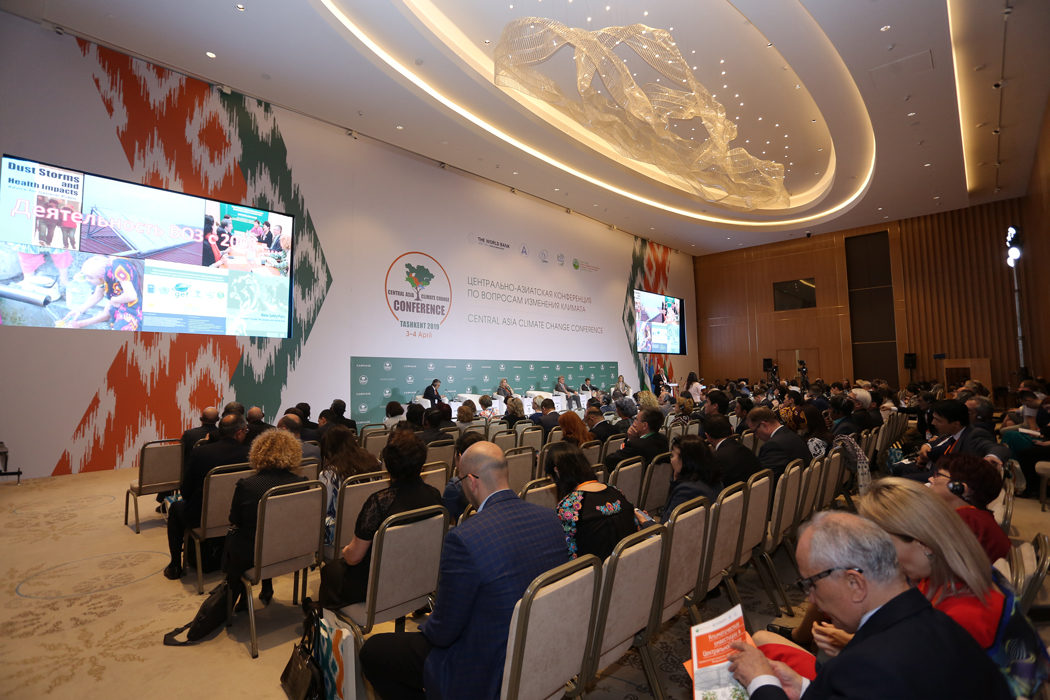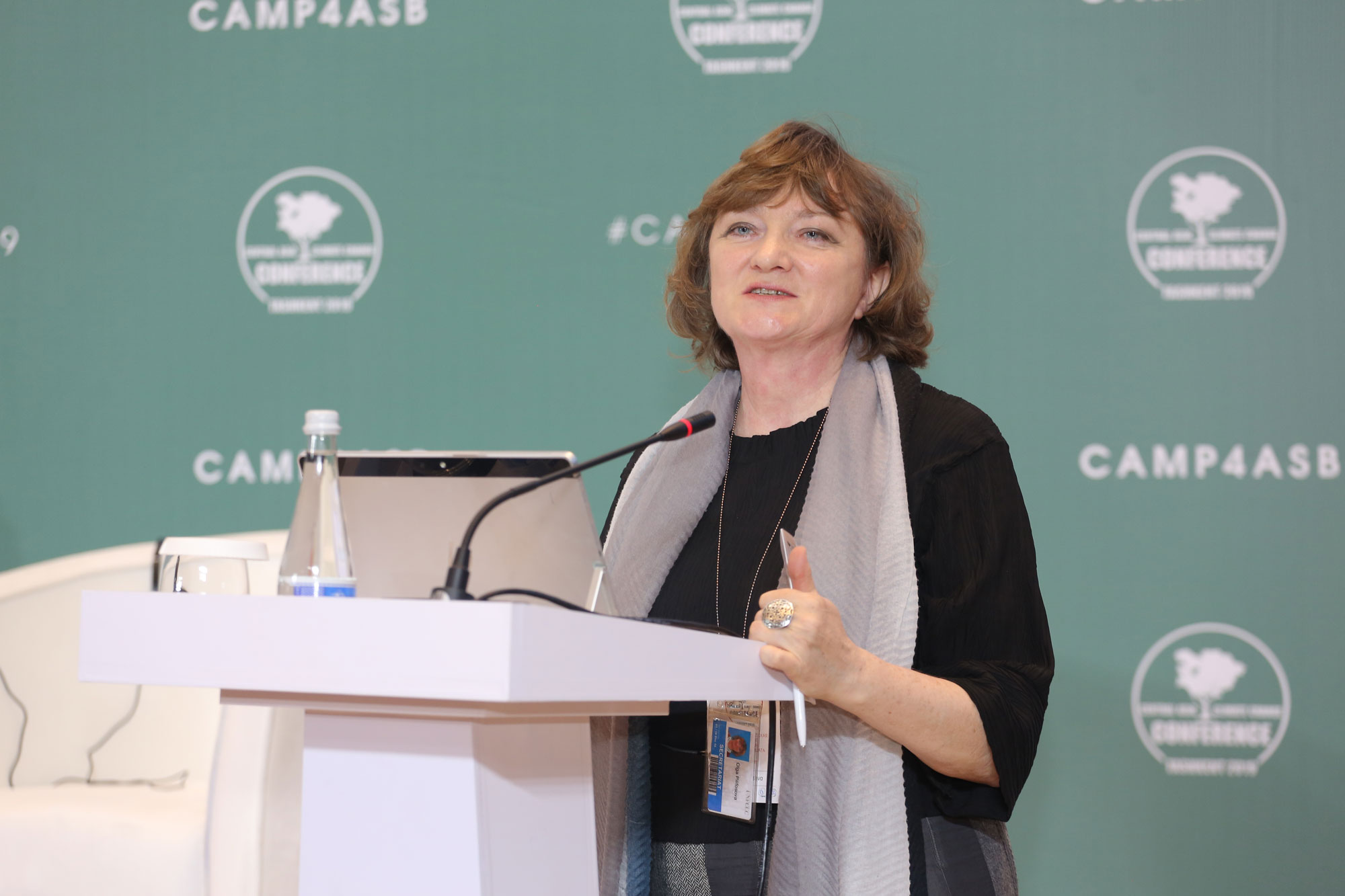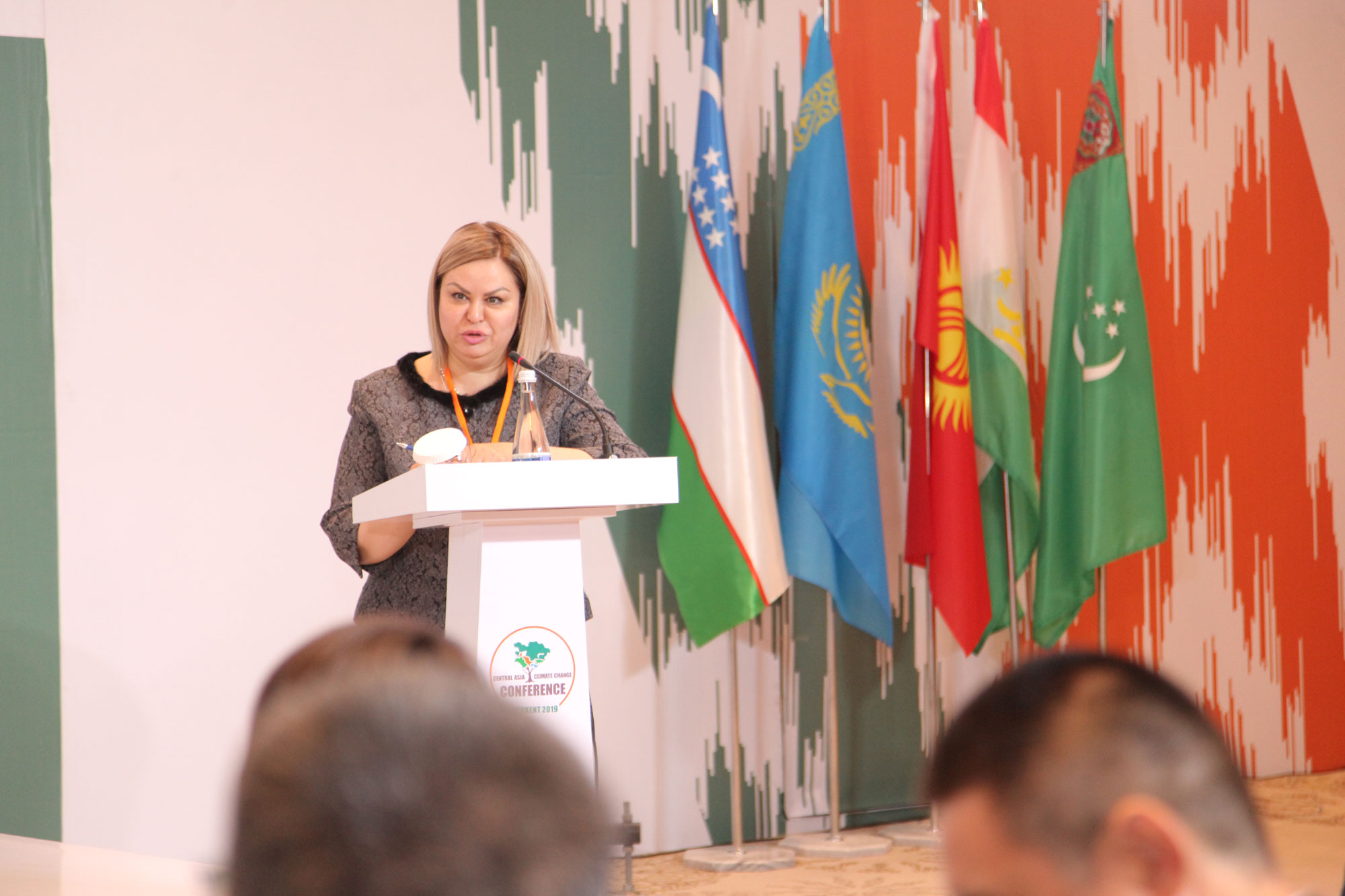
We are glad to present you the review of the first day of the Central Asia Climate Change Conference. Information on the opening ceremony of the conference is available here. Following three plenary sessions were conducted within the framework of the conference: (1) Global climate policy and national commitments (2) Impacts of climate change and adaptation in the global and regional context (3) Climate services.
The first session was focused on the discussion of successes achieved in the field of global and national climate policies, as well as the determination of steps and measures taken by the countries of Central Asia to fulfil national commitments.
Dr Olga Pilifosova made a keynote report on behalf of the secretariat of the United Nations Framework Convention on Climate Change (UNFCCC), who spoke about the global climate regime and mechanisms for implementing the Paris Agreement. Dr Pilifosova noted that when delegates ratified the Paris Agreement (2015), it became necessary to discuss further details on how the agreement would be implemented transparently and fairly for all. Countries set a national deadline to complete these negotiations on implementation guidelines in 2018.

As Olga Pilifosova noted, governments have achieved this goal by coordinating the Katowice Climate Package for COP-24. The package outlines the main procedures and mechanisms that will enable the Paris Agreement to function. Successful adoption of well-thought-out implementation guidelines promises to build confidence and inter`national cooperation in addressing one of the greatest challenges of our time — transition to a low-emission world and resilience to climate change,” - highlighted Dr Pilifosova.
Dr Olga Pilifosova also emphasized, that «... the contribution of the Central Asian countries to the implementation of the Paris Agreement goals. All countries submitted nationally determined contributions, outlined adaptation plans and identified potentials and opportunities for their implementation». According to Olga Pilifosova, such conferences as CACCC-2019 play a very important role in the implementation of all these programs.
The second session was dedicated to the impacts of climate change and adaptation in the global and regional context. Today it is clear that the effects of global warming, even by 1.5 ° C, will carry much more serious impact than expected and will require significant efforts to adapt and mitigate the effects of climate change. The main issues on the agenda of the second session are to provide information on the expected climate change trends and discuss the necessary joint measures to avoid the worst scenario of its impact on natural ecosystems, environment and human health.
Mr Yuba Sokona, Vice-Chairman of the IPCC made an opening speech at the conference, who, in a video message format, shared the conclusions of the Special Report on 1.5 ° C with the conference participants, and also elaborated on mechanisms how scientists and researchers from Central Asian countries can contribute to the work of the IPCC.
The report noted that the damage from the adverse effects of climate change will increase without adaptation measures. Various estimates suggest that economic losses from climate change will reach from 2 to 5% of the region’s total GDP by 2050.
The great attention of the conference participants was attracted by Dr Thomas Sachs, a representative of the University of Freiburg, with his report on the “Tien Shan and Pamir glaciers in the face of climate change” where he made a crucial conclusion saying that: « We now understand that the global ice volume in Central Asia is 40% less than we previously thought».
He explained that all the glaciers of Central Asia are melting and show more or less negative trend and stressed that they do not have enough field measurements to validate this data. « The vitality of glaciers increases, more and more glaciers behave differently and more research is needed to better understand the scenario. It is important to ensure the sustainability of the glacier monitoring network. It is necessary to introduce a training course on cryosphere in the university program» - concluded his speech, Thomas Sachs.
In his opinion, on-site monitoring should be conducted on a regular basis and should be supported both by donors and governments. That is why, it is necessary to promote regional cooperation between scientists, as well as in the fields of education and capacity building.
The third thematic session closing the first day of the conference was dedicated to the development of climate services. Today, this process implemented in the countries of Central Asia requires overcoming a number of problems related to understanding climate risks in an ecological and socio-economic context.
Speakers noted the need for regular collection of climate and weather data and their conversion into relevant, understandable and effective information. Such informative messages should promote adoption of climate-resilience decisions. In addition, the need for the development of timely alert technologies for the energy and water sector was emphasized as well.
The panel discussion at the session provided an opportunity for each representative from the Central Asian countries to answer key questions: what climate services and products are available now and where there is a need for additional efforts.
Within the framework of plenary sessions, the importance of the regional context in the planning of adaptation measures and measures to mitigate the effects of climate change was highlighted. «It is for this reason that, since February 2015, CAREC, in close cooperation with international partners, has been developing a regional platform for dialogue, involving the Central Asian countries to discuss the challenges, opportunities and preparedness of the region for the new Global Climate Agreement», - noted Irina Bekmirzaeva, CAMP4ASB project manager.

Conference participants agreed that the regular meetings within the framework of the Central Asian Climate Change Conference represent great importance. This event brings together countries of the region to adapt and reduce the negative impact of climate change.
Additional information: The Central Asian Climate Change Conference (CACCC-2019) is a continuation of the World Bank's initiative to exchange knowledge and information on climate change in Central Asia, supported by the CAMP4ASB project. The first conference of the project was organized on January 24-25, 2018 in the city of Almaty, Kazakhstan and was the result of the fruitful work of all stakeholders. The key messages which formed the basis of the thematic concept and program of the forthcoming CACCC-2019 event were elaborated Following the results of CACCC-2018.
